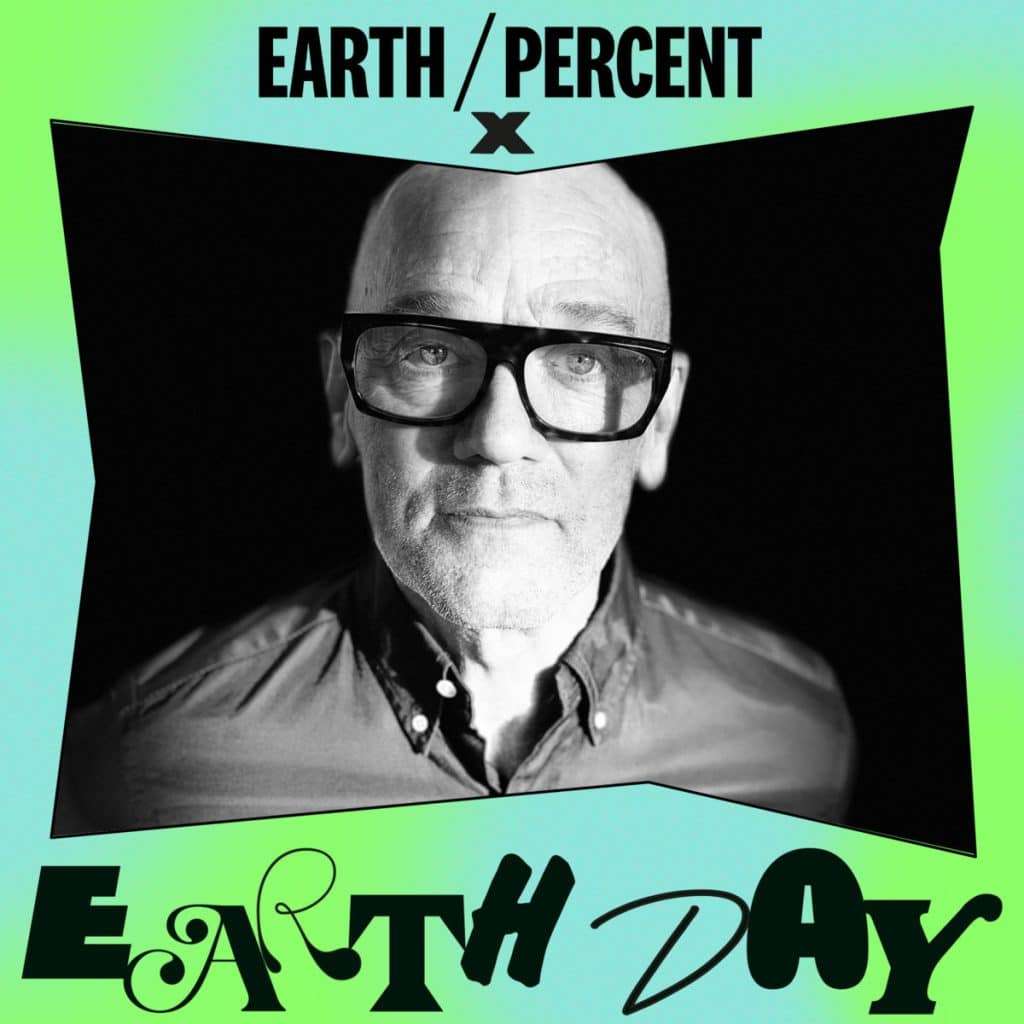If we survive climate change, we may just have musician Brian Eno to thank for it.
It’s likely that if you’re a fan of British electronic musician, composer, record producer, and visual artist, Brian Eno, it’s not casual. His diehard fans are legion—not unlike those of some of his better-known collaborators, which include the likes of David Bowie, Talking Heads, U2, Coldplay, and Roxy Music, the band he co-founded in 1970, to name a few.
But while the musician is loved for his creative, often abstract pursuits, it may turn out that his most linear line of thinking proves to be his legacy. The musician, who turns 74 this week, has become one of the most outspoken—and most hopeful—advocates for climate action.
EarthPercent
In March, Eno took to the SXSW festival to discuss climate change.
“This is the biggest movement in human history,” Eno said from his home in London—he stopped flying even before the pandemic to reduce his footprint. “Billions of us are working on this. We are where the power is.”
Eno brought a similar conversation to Glasgow last November, during the COP26 climate summit. His organization, EarthPercent, hosted a radio show during the two-week event.
EarthPercent launched a little more than a year ago. Eno’s goal with the initiative is to help the music industry reduce its environmental footprint.
The industry is responding; Eno collaborators Coldplay have led the charge, taking meaningful steps to offset their tour footprint.

Through a specially designed dancefloor, Coldplay is able to harness energy generated by the dancing crowd and use it to offset some of the event’s power needs. Coldplay also launched an app that helps fans cut their emissions through sustainable travel tips.
“Their [contribution] is really important,” Eno told The Guardian last month. “They’ve taken the matter very seriously and committed a lot of resources to it. They’re at the front of this in terms of saying, ‘We still want to play to people, so what do we do?’ Coldplay have been very conscientious and intelligent.”
Other artists including Pearl Jam, Billie Eilish, and Dave Matthews Band have also made efforts to bring sustainability front and center of their tours. Eilish also just announced Overheated, a six-day London event that takes its name from one of her songs, as part of her tour. It’ll bring together musicians, activists, and industry names in fashion to discuss the climate crisis.
“Many within the music industry want to do something to address the climate crisis but simply don’t know how, which is why EarthPercent is working with scientists and experts to identify and fund the most promising solutions,” Eno said last year.
It helps musicians donate a portion of their royalties to environmental organizations. The group’s goal is to raise $100 million through royalties by 2030.
“That’s the thing capitalism didn’t really understand. It turns out that what really sustains us is doing things together.”
-Brian Eno
“The good news,” Eno said, “is there are organizations making a difference.”
Eno’s confident that where science and art intersect may prove to be that sweet spot on the Venn diagram where the solution lies.
“Science discovers and art digests,” Eno said at SXSW.
Just ahead of Earth Day, Eno collaborated with REM frontman, Michael Stipe, on a climate-themed song Future If Future.
The song was part of a collaboration with Bandcamp, where about 100 artists released songs on the streaming platform exclusively. Bandcamp dropped its percentage from 15 percent to 10 percent, donating the proceeds to various environmental organizations.

The goal is to turn the project into an annual campaign to raise money for climate organizations and to raise awareness among fans and musicians alike.
“The biggest movement in human history is now in existence trying to deal with climate change,” Eno says. “We’re doing something as a community, and humans like that feeling. That’s the thing capitalism didn’t really understand. It turns out that what really sustains us is doing things together.”
Music as a medium
Music has always been a platform for social justice issues—much of music originating out of the American south came from Black American slaves. There were songs about the suffragettes in the 1910s, songs about fascism in the 1940s, songs about war in the 1960s, and so on.
But the music industry is now at a unique crossroads, where it’s also part of the problem. Eno quit flying more than three years ago because of its environmental impact. Air travel contributes about two percent of all global greenhouse gas emissions. But for musicians, touring is essential to making a living.

Many musicians are sensitive to the issues facing the planet, too. “Lots of people are becoming aware that we can’t just talk about the problem—we have to do something about it in our own practice,” Eno told The Guardian.
“We’ve been trying to say to people, ‘Look, if you want to find a simple way of joining the climate struggle, [EarthPercent] might be the answer,’” says Eno. “We’re a shortcut to a lot of things that otherwise might be fairly hard to do.” Those “things” include helping organizations working on environmental stewardship, clean energy transitions, and climate justice. Eno has been a vocal supporter of the work of law firm ClientEarth.
“We all have a footprint, we are all compromised,” said Eno last year. “The problem with the hypocrisy issue is that it turns the spotlight on you and says, ‘You’re the problem—you’ve got to solve the problem for yourself.’ As individuals, we aren’t really the problem, we’re in a system that is problematic.”
But he’s ever the optimist. As he explained during SXSW, there are good signs, like more women getting involved in the policymaking will help lead to a more equitable distribution of wealth to tackle climate and justice issues that abound.
“We’re starting to think differently,” he said.


